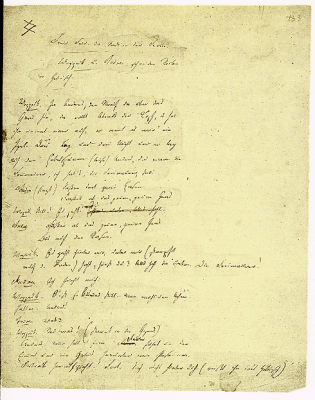I'm only halfway through the book, but I really like the way Woolf emphasizes the constructedness of her protagonist's(*) gender (and it's been so long since my last post that I'm just happy to have something to write about again ;-)).
Short summary: Orlando is born male and lives as a man for the first part of his life, but then suddenly becomes a woman - he goes to sleep as a man one day and wakes up as a woman the next. Interestingly, Orlando does not "[show] any signs of discomposure" at this change of sex (123)(**), and the narrator emphasizes that it does not affect Orlando in any major way to suddenly wake up in a female body:
"Orlando had become a woman - there is no denying it. But in every other respect, Orlando remained precisely as he had been. The change of sex, though it altered their future, did nothing whatever to alter their identity. Their faces remained, as their portraits prove, practically the same. His memory - but in future we must, for convention's sake, say 'her' for 'his', and 'she' for 'he' - her memory then, went back through all the events of her past life without encountering any obstacle. [...]" (124).
Whether man or woman, Orlando's identity remains - according to the narrator - the same. It is "convention" (of language) that demands that the pronoun be changed; similarly, the novel goes on to show that it is not so much Orlando's female body that will alter her future, but (English) gender conventions. Orlando spends the first weeks (?) after her sex change with Turkish gipsies, where it does not seem to matter much which sex/gender one belongs to. She thus only becomes aware of any significant change when she gets back into contact with English society, where gender roles are much more clearly delineated:
"It is a strange fact, but a true one, that up to this moment [when she sails back to England on an English ship, BS] she had scarcely given her sex a thought. Perhaps the Turkish trousers which she had hitherto worn had done something to distract her thoughts; and the gipsy women, except in one or two important particulars, differ very little from the gipsy men" (136).
The narrator sets up clothes as one major factor of "doing gender" here: as a young Englishwoman of rank, Orlando has to wear skirts. This in turn makes her adapt her behaviour in other ways as well: when she impatiently tosses her foot and accidentally exposes part of her legs, a sailor observing her from the mast starts violently and almost falls to his death. Orlando concludes that "If the sight of my ankles means death to an honest fellow [...], I must, in all humanity, keep them covered" (141). Living in a female body in this context forces Orlando to keep her body covered, as it will otherwise pose a threat to the men around her - her body has become something potentially dangerous that should be hidden from sight, which in turn restricts her movements. It is not the female body itself that makes Orlando change her behaviour and view of herself, but the way her environment reacts to it.
However, despite the limited range of actions that will be available to her, Orlando is very happy to have become a woman - up to where I have read, the narrator has only discreetly alluded to "something [that] had happened during the night to give her a push towards the female sex", something that involved the (male) Captain of the ship bringing her to England (145)...?
(I hope I've explained enough of the story so you can follow, otherwise just ask!)
(*) I just love English - it's so nice to be able to use the same word for both genders...
(**) My page indications refer to the Penguin Red Classic Edition 2006.

